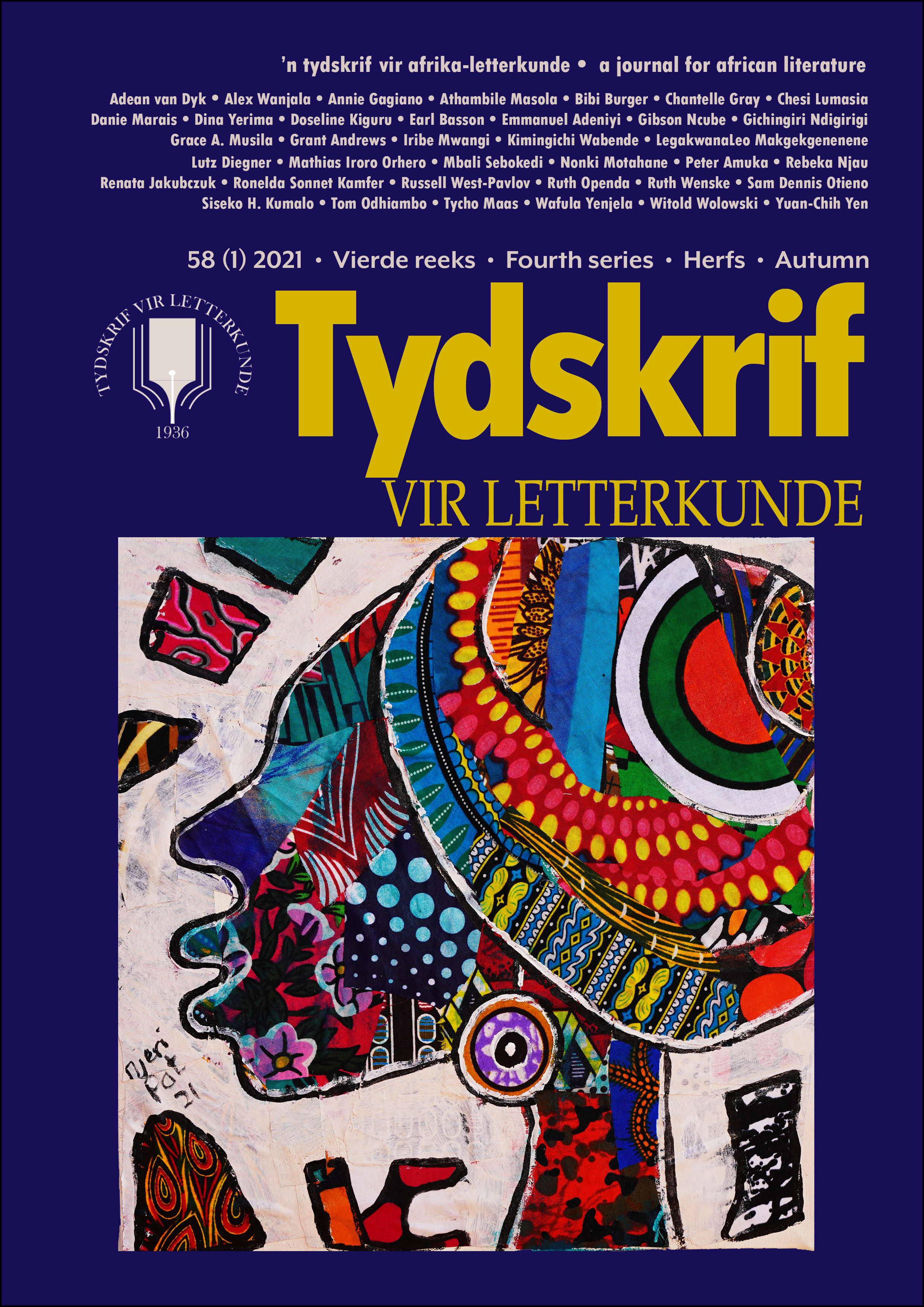Alienation and estrangement in Dinaw Mengestu’s All Our Names
DOI:
https://doi.org/10.17159/tl.v58i1.8210Keywords:
cultural identity, cosmopolitanism, hybridity, alienation, racismAbstract
In this article I explore issues of negotiating cultural identity in new geopolitical spaces as presented in Dinaw Mengestu’s All Our Names. I examine the portrayal of a liminal character living in Uganda and America and how the author narrates his daily experiences of negotiating identity in order to underscore the power of hierarchies of ethnicity, class, race, and nationalistic discourses at play in determining who belongs and who does not. I analyse the ways in which names are used as narrative strategy to show that identity is never singular or fixed but plural and continuous. I explore how, through Isaac’s unnaming, naming, and renaming, Mengestu contests the fixity of names and identity by indicating naming as a processual act and how a person’s identity is layered and thus cannot be fully contained within a single marker. Drawing upon the concepts of hybridity, third space, and cosmopolitanism, I demonstrate how subject position and cultural identity are not fixed into definite categorical distinctions but are fluid concepts. Mengestu does not only raise possibilities of belonging beyond the confines of a nation or community, but also presents a cosmopolitan world where negotiation and belonging is difficult because of power differences, racism, marginalisation, and discrimination.
Downloads
References
Alderman, Derek. “Place, Memory and the Interpretation of Cultural Landscapes.” The Ashgate Research Companion to Heritage and Identity, edited by Brian Graham & Peter Howard. Ashgate, 2008, pp. 195–213.
Appiah, Kwame A. Cosmopolitanism: Ethics in a World of Strangers. W. W Norton, 2006.
Ashcroft, Bill. “Beyond the Nation: Post-Colonial Hope.” The Journal of the European Association of Studies on Australia vol. 1, 2009, pp. 12–22.
Bal, Mieke. Narratology: Introduction to the Theory of Narrative. U of Toronto, 1997.
Benston, Kimberly. “‘I Yam what I Am’: Naming and Unnaming in Afro-American Literature.” Black American Literature Forum vol. 16, no. 1, 1982, pp. 3–11. DOI: https://doi.org/10.2307/2904266.
Bhabha, Homi K. The Location of Culture. Routledge, 1994.
Bhabha, Homi K. “The Third Space.” Identity, Community, Culture, Difference, edited by Jonathan Rutherford. Lawrence & Wishart, 1990, pp. 207–21.
Bodenhorn, Barbara & Gabrielle Vom Bruck. The Anthropology of Names and Naming. Cambridge U P, 2006.
Boucher, Francois, Isabelle Aubert & Sophie Guérard de Latour. “Approaches to Cosmopolitanism: Review Essay on Their History, Analysis and Application to the EU.” NOVAMIGRA, 2019, pp. 1–49.
Chakraborty, Arup R. “Liminality in Post-Colonial Theory: A Journey from Arnold van Gennep to Homi K. Bhabha.” Anadhyun: An International Journal of Social Sciences (AIJSS) vol. 1, no. 1, 1996, pp. 145–53.
Culler, Jonathan. Literary Theory—A Very Short Introduction. Oxford U P, 2006.
Delanty, Gerard. “A cosmopolitan approach to the explanation of social change: social mechanism, processes, modernity.” The Sociological Review vol. 60, no. 2, 2012, pp. 334–54. DOI: https://doi.org/10.1111/j.1467-954X.2012.02076.x.
Delanty, Gerard. “The Cosmopolitan Imagination: Critical Cosmopolitan and Social Theory.” The British Journal of Sociology vol. 57, no. 1, 2006, pp. 25–47. DOI: https://doi.org/10.1111/j.1468-4446.2006.00092.x.
Derrida, Jacques. On the Name, edited by Thomas Dutoit. Trans. David Wood, John P. Leavey Jr. & Ian McLeod. Stanford U P, 1995.
Derrida, Jacques. The Politics of Friendship. Verso, 1997.
Finch, Janet. “Naming Names: Kinship, Individuality and Personal Names.” Sociology vol. 42, no. 4, 2008, pp. 709–25. DOI: https://doi.org/10.1177/0038038508091624.
Francesconi, Sabrina. “Negotiating of Naming in Alice Munro’s ‘Meneseteung.’” Journal of the Short Story in English vol. 55, 2010, pp. 1–10.
Ganapathy-Dore, Geetha. “Playing Hide and Seek with Names and Selves in Salman Rushdie’s Joseph Anton, A Memoir.” Atlantis vol. 35, no. 2, 2013, pp. 11–25.
Georgiou, Myria. Diaspora, Identity, and the Media: Diasporic Transnationalism and Mediated Spatialities. Hampton, 2006.
Gyekye, Kwame. Tradition and Modernity: Philosophical Reflections on the African Experience. Oxford U P, 1997.
Hadja, Jan. “Alienation and Integration of Student Intellectuals.” American Sociological Review vol. 26, no. 5, 1961, pp. 758–77. DOI: https://doi.org/10.2307/2090205.
Hall, Stuart. “Who needs Identity?” Questions of Cultural Identity, edited by Stuart Hall & Paul Du Gay. SAGE, 2000, pp. 15–30.
Hook, Derek. “Frantz Fanon, Steve Biko, ‘psychopolitics’ and critical psychology.” LSE Research Online, 2004, pp. 84–114.
Kripke, Saul A. Naming and Necessity. Harvard U P, 1980.
Kroetsch, Robert. “Canadian Writing: No Name is My Name.” The Forty-Ninth and Other Parallels: Contemporary Canadian Perspectives, edited by David Staines. U of Massachusetts, 1986, pp. 116–28.
McCallum, Robyn. Ideologies of Identity in adolescent Fiction: The Dialogic Construction of Subjectivity. Garland, 1999.
McLeod, John. Beginning Postconialism. Manchester U P, 2000.
Mengestu, Dinaw. All Our Names. Hodder & Stoughton, 2014.
Mengestu, Dinaw & Josephine Reed. “Big Read interview with Dinaw Mengestu.” National Endowment for the Arts. 18 Jun. 2017. https://www.arts.gov/stories/other/big-read-interview-dinaw-mengestu.
Pollock, Sheldon I. et al. “Cosmopolitanism.” Public Culture vol. 12, no. 3, 2000, pp. 577-89.
Pucherova, Dobrota. “Re-Imagining the Other: The Politics of Friendship in Three Twenty-First Century South African Novels.” Journal of Southern African Studies vol. 35, no.4, 2009. pp. 929-43.
Sacks, Sam. “The Rise of the Nameless Narrator.” The New Yorker. 3 March 2015. https://www.newyorker.com/books/page-turner/the-rise-of-the-nameless-narrator.
Vertovec, Steven & Robin Cohen. Conceiving Cosmopolitanism: Theory, Context and Practice. Oxford U P, 2002.
Voronkova, Anastacia. “Are Nationalism and Cosmopolitanism Compatible?” e-International Relations. 25 Nov. 2010. https://www.e-ir.info/2010/11/25/are-nationalism-and-cosmopolitanism-compatible/.
Walkowitz, Rebecca L. Cosmopolitan Style: Modernism Beyond the Nation. Columbia U P, 2006.
Werbner, Pnina. “Vernacular Cosmopolitanism.” Theory, Culture and Society vol. 23, no. 2–3, 2006, pp. 496–98. DOI: https://journals.sagepub.com/doi/10.1177/026327640602300291.
Downloads
Published
Issue
Section
License
Copyright (c) 2021 Tydskrif vir Letterkunde

This work is licensed under a Creative Commons Attribution-ShareAlike 4.0 International License.


 https://orcid.org/0000-0001-6465-6584
https://orcid.org/0000-0001-6465-6584


.png)